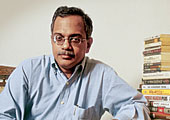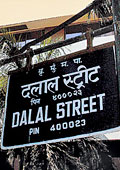 |
| MEG’s Sudarshan: Vocational courses
show the way to a growing economy |
Ial-Mart is the world's
largest employer in the private sector, with a global workforce
of 14 lakh. The US retailing behemoth's entry into India will
conservatively call for an addition of at least 2-3 lakh in the
next few years. That's the kind of addition its competitors in
the organised retailing space in the country, namely Reliance
Retail and the Future Group, are expected to make. The industry
as a whole will need, according to estimates, 15-20 lakh people
in the next two years.
Where will they come from?
In that question lies an opportunity for educational institutes-to
train a sea of people for employment at the entry level across
industry. That's what the Manipal Education Group (MEG) plans
to do. It will impart vocational education to students in sunrise
sectors such as telecom, media, banking and retail, after which
they can be picked up by India Inc. Says K. Sudarshan, Managing
Partner, EMA Partners International, an executive search firm:
"Sooner than later this had to happen. When you have a demand
for 1,000 CEOs in the next 24 months, just imagine the amount
of employees you require at the entry as well as middle and senior
management levels."
It's against such a backdrop that meg plans to offer certificate
and diploma courses in banking, retail, telecom, IT, BPO, media
and infrastructure. Says Anand Sudarshan, Group President, MEG:
"Supply and time constraints have seen organisations like
ICICI Bank taking initiatives with educational institutions for
creating tailor-made courses that fit their requirement."
Indeed, ICICI Bank has tied up with MEG to offer certificate courses
in phone banking operations. The three-month course deals with
all aspects of banking operations and products, including training
on Finacle-a banking software-and credit card technology. Says
K. Ramkumar, Chief Human Resources Officer, ICICI Bank: "Trained
manpower gives us the freedom to focus on our core business as
against opening a training institute in my office. I have a requirement
of 2,000 people every month and can't afford to waste time training
them from scratch in a competitive environment." The banking
sector currently employs 9 lakh people and the number is expected
to double in the next few years. As per industry observers, ICICI
Bank has a similar tie-up with NIIT for teaching tailor-made courses,
and is also talking to second-tier B-schools to bring changes
in their curriculum that will suit the banking industry. Says
Sudarshan: "These courses are skilled-based training that
will capture the needs of the industry." To start with, the
course will be offered in six metros, including Pune and Hyderabad.
"Within a year we plan to expand the vocational courses to
20 cities across India." The course duration varies from
45 days to one year, with fees ranging from Rs 10,000 to Rs 1
lakh. Apart from ICICI Bank, MEG has also tied up with IBM, Bharti
Comtel, Shoppers' Stop, Wipro BPO, Quipo and Apple.
Luis Miranda, President & CEO, IDFC Private Equity, which
has invested 10 per cent stake in Manipal Universal Learning,
parent of Manipal Education, for a sum of Rs 135 crore, says:
"This is just a drop in the ocean. We require more such institutions
that aim to address this shortfall and create a vast trained talent
pool through courses that are designed in conjunction with industry,
and which are internationally benchmarked." However, he is
quick to add that "till the society doesn't change and parents
aren't ready to accept vocational courses, it will be difficult
to attract more students." Compared to China, which has 5
lakh senior-secondary vocational schools, India has only 7,000
such schools. And only 3 per cent of students learn through vocational
education, as against 85 per cent of the youth in developed and
developing countries.
-Mahesh Nayak
When
Gold Becomes Rust
Pepsi repositions its gold-coloured drink
after the World Cup fiasco.
After the early exit of
India's flannelled fools from the ICC World Cup 2007, most marketers
were quick to pull the plug on commercials that had anything to
do with cricket or cricketers. One of the biggest casualties has
been PepsiCo's Rs 370-crore Blue Billion campaign. Another victim
of the disaster in the Caribbean appeared to be Pepsi Gold, the
limited edition gold-coloured cola launched to coincide with the
cricket fiesta. The drink is ostensibly Pepsi's tribute to the
gold-coloured World Cup trophy and to the spirit of winning and
going for gold; it is also supposed to embody the never-say-die
spirit of the Indian cricket fan. However, with the World Cup
trophy not headed home, with the team not quite attuned to the
spirit of winning, and with the Indian cricket fan an oxymoron
these days, what does Pepsi do with its gold-coloured fizzy drink?
Simple, it rustles up a new commercial that attempts to portray
the optimism that characterises today's youth. Needless to say,
it does not have any celebrities (not cricketers for sure). Instead
it features a group of youngsters announcing that they will get
the Cup, next time around ('Agla World Cup Hum Layenge')! The
company hopes to bring in a wave of optimism amongst all those
who have been disappointed with the Indian cricket team at the
World Cup. "The campaign also showcases Pepsi Gold as a symbol
of ambition and self-confidence of a young India-an India that
may be down, but is not out," is how Vipul Prakash, Executive
Vice President (Marketing), Cola, PepsiCo India, puts it. Pepsi
has also pulled out its commercial 'Ladega to Jeetega', which
featured Virender Sehwag, Rahul Dravid, Sachin Tendulkar, Yuvraj
Singh and Mahendra Singh Dhoni and replaced it with a new campaign
featuring Shah Rukh Khan. That should make the billion less blue.
-Pallavi Srivastava
Taking
Stock
Brokerages are leaning on private
equity for growth.
The stock markets may have cooled
off a bit, but the same can hardly be said for the burst of consolidation
amongst stock broking firms. Recently, in a span of under 10 days,
three domestic broking outfits-Anand Rathi Securities, Fortune
Financial Services and Geojit Financial Services-offloaded stakes
to international private equity (PE) firms. For good measure,
too, ask (a domestic securities firm formed by brothers Asit and
Sameer Koticha) bought out the 50 per cent stake of Raymond James
in their 13-year-old joint venture, ask Raymond James.
The interest is intense on the buyer's side as well as the seller's.
Whilst for the former, it means getting a piece of the action
at a relatively early stage (if the long-term India story holds
good), for the brokers a stake sale is necessary to fuel growth.
As Amit Rathi, Director, Anand Rathi Securities, which has offloaded
nearly 20 per cent of its equity to Citigroup Venture Capital,
points out: "The business has become more capital-intensive.
With competition increasing, you have to be well-equipped to offer
a complete bouquet of financial services to your clients."
For instance, the Citigroup infusion will allow Anand Rathi Securities
to intensify its focus on retail broking, wealth management and
institutional broking. Rathi adds that the plan is to expand-not
just in India but internationally too-to 350 branches from 150
currently in the next two years.
Edelweiss Securities is another brokerage that's roped in partners-the
Government of Singapore and Galleon Partner-by offloading 15 per
cent, and pocketing Rs 450-500 crore in the bargain. "Partnering
with PE firms has its advantages as well as disadvantages,"
says Rashesh Shah, CEO & MD, Edelweiss. Apart from the money,
the benefits are product knowledge and global distribution. The
downside comes into play when the partners are unequal. "We
ended the JV with Raymond James as they were passive partners
and were not bringing any value to the table," says Asit
Koticha, MD, ask Group, who has now divided his business into
four verticals-broking, wealth management, portfolio management
services and investment banking.
The good news, however, is that the brokerages who've offloaded
a portion of their equity to the PE tribe are now well placed
to step on the gas. Edelweiss, for instance, will venture into
the credit market by getting into mortgages. Asset management
is also on the cards. Meantime, to increase its focus on institutional
broking business and access more NRI clients for distribution
of third party products, Geojit Financial Services offloaded a
34.35 per cent stake to BNP Paribas. Says C.J. George, Managing
Director, Geojit Financial Services: "Apart from the broking
business being capital intensive, the need for a wider distribution
network was the reason for selling a stake."
-Mahesh Nayak
|






